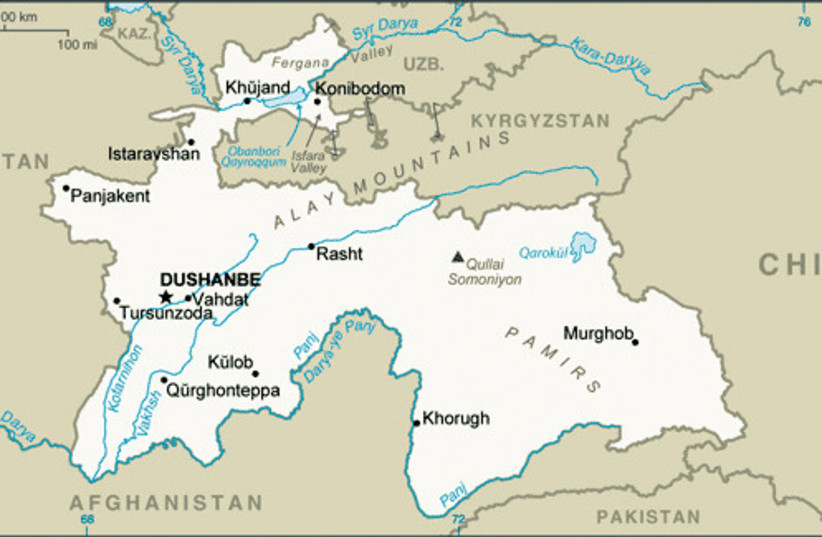Earlier this week, the parliament of Tajikistan, passed a resolution banning the usage of hijabs or traditional Muslim headscarves. The law’s language banned any ‘foreign attire,’ levied a fine of over $740 for regular citizens defying the decree, and imposed even larger fines for official and religious personalities.This is one of a series of measures taken in the country in an attempt to regulate and halt extreme Islamist tendencies.
Tajikistan in Central Asia is 90% Muslim. However, for an ex-Soviet nation bordering Islamist countries, such as Taliban-ruled Afghanistan and the Islamic Republic of Iran, and whose nationals took part in the Moscow attacks in March, the fear of radicalization is seen as an imminent threat to society as a whole. The Jerusalem Post reached out to two Israeli experts on Central Asian affairs to hear more about the decision and its prospects.
‘Russia also fears a Tajik collapse'
Dr. Ariel Cohen, Senior Fellow at the Atlantic Council, pointed out that, though it might seem illiberal, from the Western human rights perspective, to ban the hijab, the Tajik government is more concerned about the growth of Salafism and is making great efforts to strengthen its secular nature. This has become particularly urgent after the terrorist attacks in Moscow in March, which were carried out by Tajik radical Islamists and left over 140 dead and 300 injured.

“Is this going to help? Probably not,” said Cohen. “The problems are too deep and systemic to be solved by a ban on headgear, forcible shaving of men’s beards, or compulsory shaving, which is also a law. This may only further people’s hatred of the Emomali Rahmon regime. But the threat of ISIS-K (The Islamic State in Khorasan, the Central Asian branch of ISIS) is seen as a much worse threat for the current government, despite problems of poverty, corruption, and incompetence. A push toward an Islamic regime in Tajikistan would also be seen as a serious blow to Russian imperialism in Central Asia and [the] stability of the region,” he said.
Last ditch attempt to fight social media and foreign influence
Dr. Zeev Levin from the Truman Institute, the Hebrew University, and The Forum for Regional Thinking added that the background to this decision should be seen through both geopolitical and historical lenses.
“In terms of geopolitics, it is rather clear. Tajikistan neighbors two Islamic countries, Afghanistan and Iran, and they are well aware of their problematic neighborhood in terms of the activity of terrorist organizations and radical Islam,” said Levin. “The Tajik language is mutually intelligible with Persian, the official language of Iran; while the Taliban also seek to influence the secular Tajiks, as both groups are Sunni, and there are millions of Tajiks living in Afghanistan.
“At the same time all the republics, even though the majority of the population is Muslim, there is a separation between religion and state and it is clear that there is no desire to be dragged into a religion-politics struggle,” explained Levin.
HISTORICALLY, Levin pointed out that Tajikistan is the only Central Asian country to have experienced a civil war following the breakup of the Soviet Union, fought between a post-communist nationalist bloc and radical Islamists.
“In the end of the war, in which tens of thousands of the country’s citizens perished, a status quo was created between the Islamic Party and the central government regarding a sort of distribution of power. Yet, 30 years after the civil war, President Emomali Rahmon has managed to establish his rule, outlaw the Islamic party, and send political opponents to prison or exile. He also shut thousands of mosques.”
Nowadays, all religious issues in the country are strictly supervised by the government. “The hijab act is only the latest in a series of rules and regulations of an ongoing process of the secular state’s attempt to fight instances of extreme Islamization within civil society,” added Levin.
“Children up to the age of 18 are not allowed to study religion except in an official setting, and those who defy the law and teach minors face three years in prison. Men are not allowed to grow beards, and now it’s the women’s turn with the ban of the Hijab.”
Levin describes the ban as “a rather desperate attempt by the central regime to fight against social media and foreign influence, and against attempts of people to look for some kind of framework to express their Muslim heritage, which is part of their historical culture after all. In this context, the ban is very carefully formulated as a ban, not against the hijab, but against any ‘non-traditional Tajik garment,’ though everybody understands what it means.”
Can we even know what the public thinks of these rules and regulations?
“Those who open their mouths against it go to prison, and the fewest and smallest attempts at separatism are suppressed,” said Levin. “On the other hand, there are citizens who are genuinely worried about Islamization and extremism and do not want to end up becoming like their neighbor Afghanistan. There were many Tajik terrorists who enlisted in ISIS, the attackers in Moscow were also Tajiks. So, this is a significant issue.”
How do the Tajiks view Israel?
“The Islamization also has to do with attitudes towards Israel and the Jews, which have worsened and are probably worse than elsewhere in the region of Central Asia. Surely, the regime is comfortable with citizens sounding their opposition to Israel. Nevertheless, it’s a wonderful country and worth visiting on calmer days,” he concluded.
